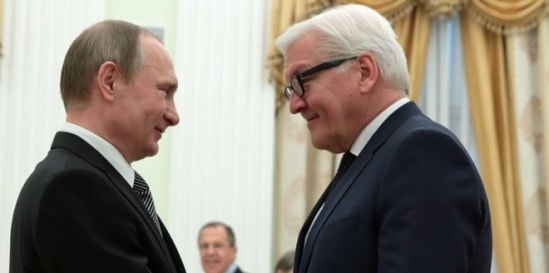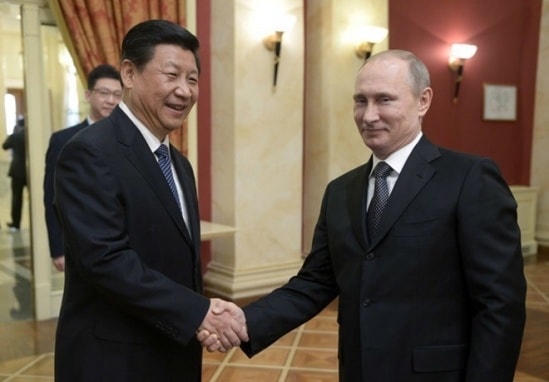Germany sets conditions for Russia's return to G7
Within the framework of the G-7 Summit to be held in May 2016, the issue of bringing Russia back to the G-7 will be one of the main topics of discussion.
 |
| Russian President Putin and German Foreign Minister Frank-Walter Steinmeier (right). |
The above information was given by German Foreign Minister Frank-Walter Steinmeier. Accordingly, in addition to the issue of bringing Russia back to the G-7, the G-7 Summit also discussed the issue of increasing contacts between Moscow and NATO through the form of the Russia-NATO Council.
In an interview with PDA TV channel, Mr. Frank-Walter Steinmeier said that bringing Russia back to the G-7 can only be done under certain conditions.
In particular, Russia must step up efforts to resolve the Ukraine crisis, as well as play a more active role in establishing peace in Syria.
"Obviously, no serious international crisis can be resolved without Russia's participation," said Mr. Frank-Walter Steinmeier about Russia's role.
Established in 1975, the G-7 includes seven developed industrial nations: the United States, Britain, France, Germany, Italy, Canada and Japan. This organization is considered an informal club to identify issues related to promoting economic development of leading countries.
Russia received membership in this "aristocrats club" during the period when Boris Yeltsin was President of Russia, turning the G-7 into the G-8. During the crisis in Russia-US relations, the US often proposed the idea of excluding Russia from this organization.
The crisis in Ukraine and the change in status of Crimea are factors that help the US achieve its goal of excluding Russia from the G-8.
 |
| Chinese President Xi Jinping and Russian President Putin (right). |
G-20 is better than G-8
It is not yet clear whether the comments of German Foreign Minister Frank-Walter Steinmeier represent the views of all G-7 leaders, but it can be predicted that the decision to bring Russia back to the G-8 will receive the support of at least two members, Italy and France. These two countries have repeatedly proposed to improve relations and increase dialogue with Russia.
"There is no consensus (in the G7, on the issue of bringing Russia back to the G-8) yet, but there are still other countries that support Frank-Walter Steinmeier's point of view," said Associate Professor of the Moscow Institute of International Relations Ivan Safranchuk.
In addition to Italy and France, Japan, the country that will host the G-7 Summit, is also a country that supports improving relations with Russia. According to the plan, Japanese Prime Minister Shinzo Abe plans to visit Moscow in early May.
Notably, returning to the G-8, according to the Chairman of the Presidium of the Russian Foreign and Defense Policy Council (SVOP) Fedor Lukianov, does not mean much for Russia.
The G-20 is the organization that Russia needs to strengthen its position. China, a member of the G-20, is also a power that does not participate in the G-7, but is still the country with the best economic indicators in the world.
Previously, the Kremlin has repeatedly stated that in the G-20, a framework of cooperation where countries have equal status and are less dependent on the United States, actions and agreements are much smoother than in the G-7.
During Russia's most severe period of isolation, Russian President Putin still took advantage of meetings within the G-20 framework to make agreements with Western leaders.
Frank-Walter Steinmeier is considered one of the politicians who strongly support improving relations and bringing Russia closer to the West. This effort is highly appreciated by the Russian side. One of the senior Russian diplomats in an interview with the magazine "Russian Newspaper" described the German Foreign Minister as "a pleasant person and a sincere politician".
According to sources from EU diplomatic circles provided to "Russian Newspaper", the internal situation of the EU is currently changing rapidly and this will have a significant impact on the EU's stance in the coming time.
Russia and NATO begin to resume dialogue
Although Russia-West relations are in an unfavorable phase, the "working dialogue" between Russia and the EU is still being implemented. It is expected that in mid-May, a meeting between EU and Russian diplomats on promoting relations will be held. This information was revealed to the Russian press by a source in SVOP.
Due to the crisis in relations, Russia not only lost its G-8 membership but also lost the ability to conduct political dialogue with NATO.
Analysts say that resuming dialogue with NATO is more important than membership in the G-8 because this dialogue will make an important contribution to solving issues directly related to international security.
The good news is that the two sides, Russia and NATO, have recently come to an agreement on the need to resume the interrupted dialogue.
The first meeting of the Russia-NATO Council at ministerial level will be held in Brussels in two weeks, Russia's Permanent Representative to NATO Aleksandr Grushko told the Russian press on Saturday.
This will be the first ministerial-level meeting between Russia and NATO since dialogue at this level was suspended in 2014.
According to diplomats, it is still difficult to determine the issues to be discussed at this meeting. NATO wants to discuss mainly the situation of the Ukraine crisis, as well as discuss Russia's frequent flights close to the borders of NATO member countries.
NATO leaders have repeatedly accused Russian military aircraft of regularly conducting reconnaissance flights near the borders of NATO member countries. Although this action by Russia has not yet caused any problems, it has caused many diplomatic controversies in recent times.
For its part, Russia wants to discuss issues it considers more urgent, such as the fight against terrorism and the situation in Afghanistan.
The central government of Afghanistan is currently unable to control large parts of its territory, which is a major concern for Moscow. Afghanistan shares a border with Tajikistan – Russia’s ally in the Collective Security Treaty Organization (CSTO) military alliance.
Russia is concerned about the situation in Afghanistan because Russian diplomats believe that the situation in Afghanistan is in a "catastrophic" phase.
Russia is concerned about the situation in Afghanistan because this Central Asian country is not only a place to strengthen terrorist organizations but also a route for transporting and trafficking illegal drugs.
Moscow needs assurances that NATO, which has so far maintained a military presence in Afghanistan, will take more responsibility for dealing with these threats.
Before the relationship was frozen, Russia and NATO still appreciated their cooperation in Afghanistan, including military cooperation. NATO used US funds to purchase Russian helicopters. Russia also cooperated with NATO in training local experts to fight drug trafficking.
The content is made through reference to information sources from the newspaper "Gazeta", one of the most prestigious and most visited electronic newspapers in Russia today.
Legal
| RELATED NEWS |
|---|
